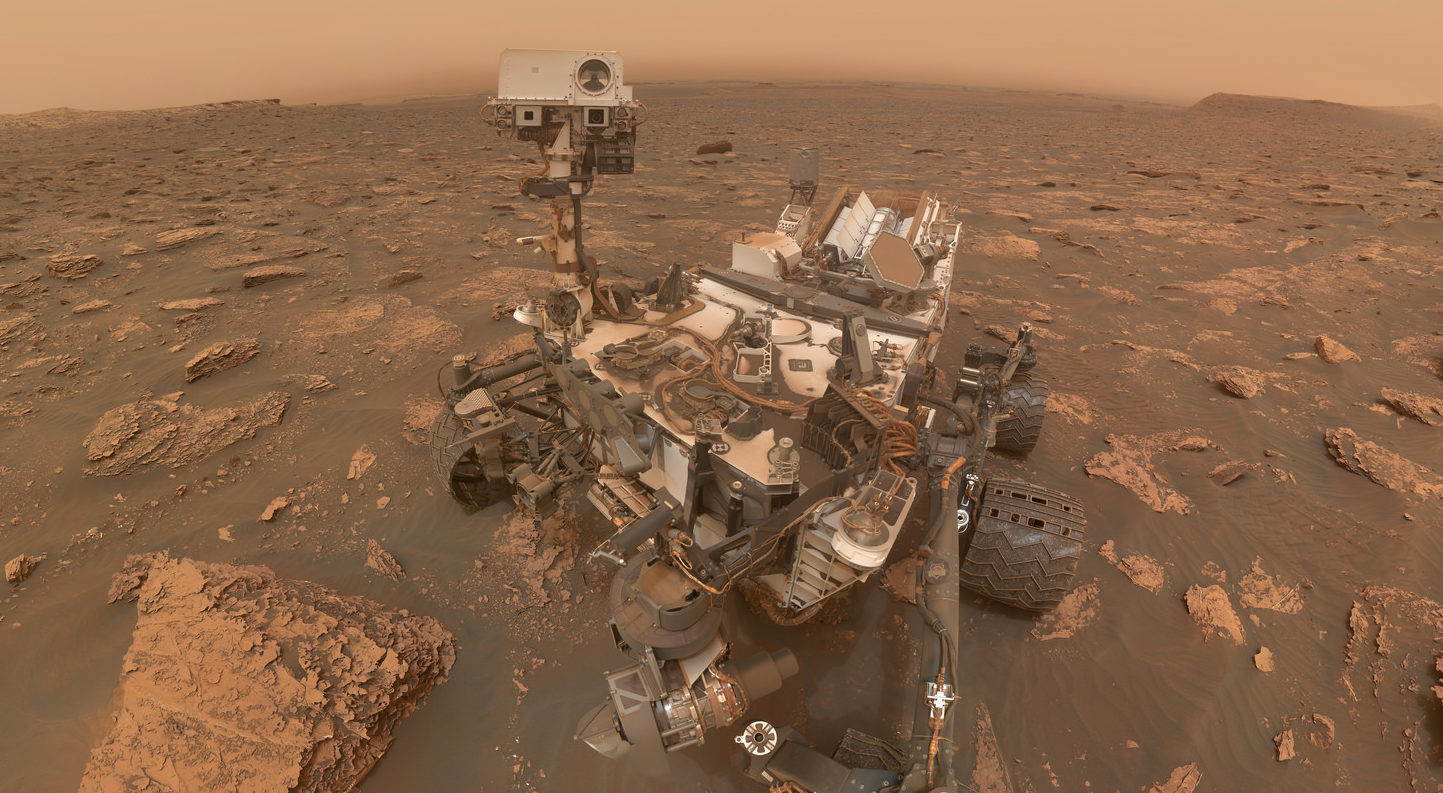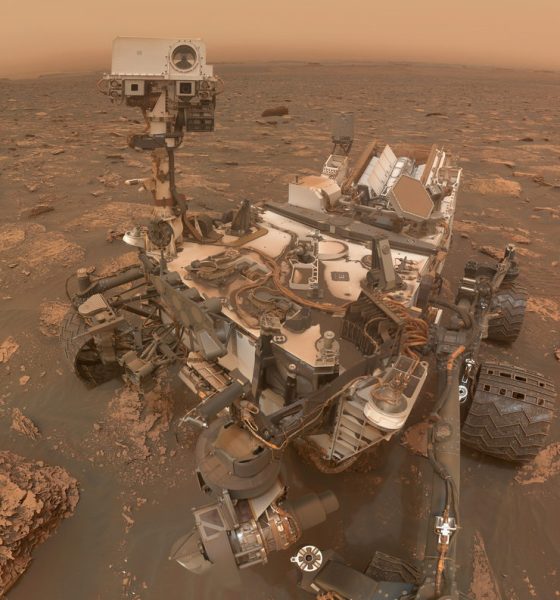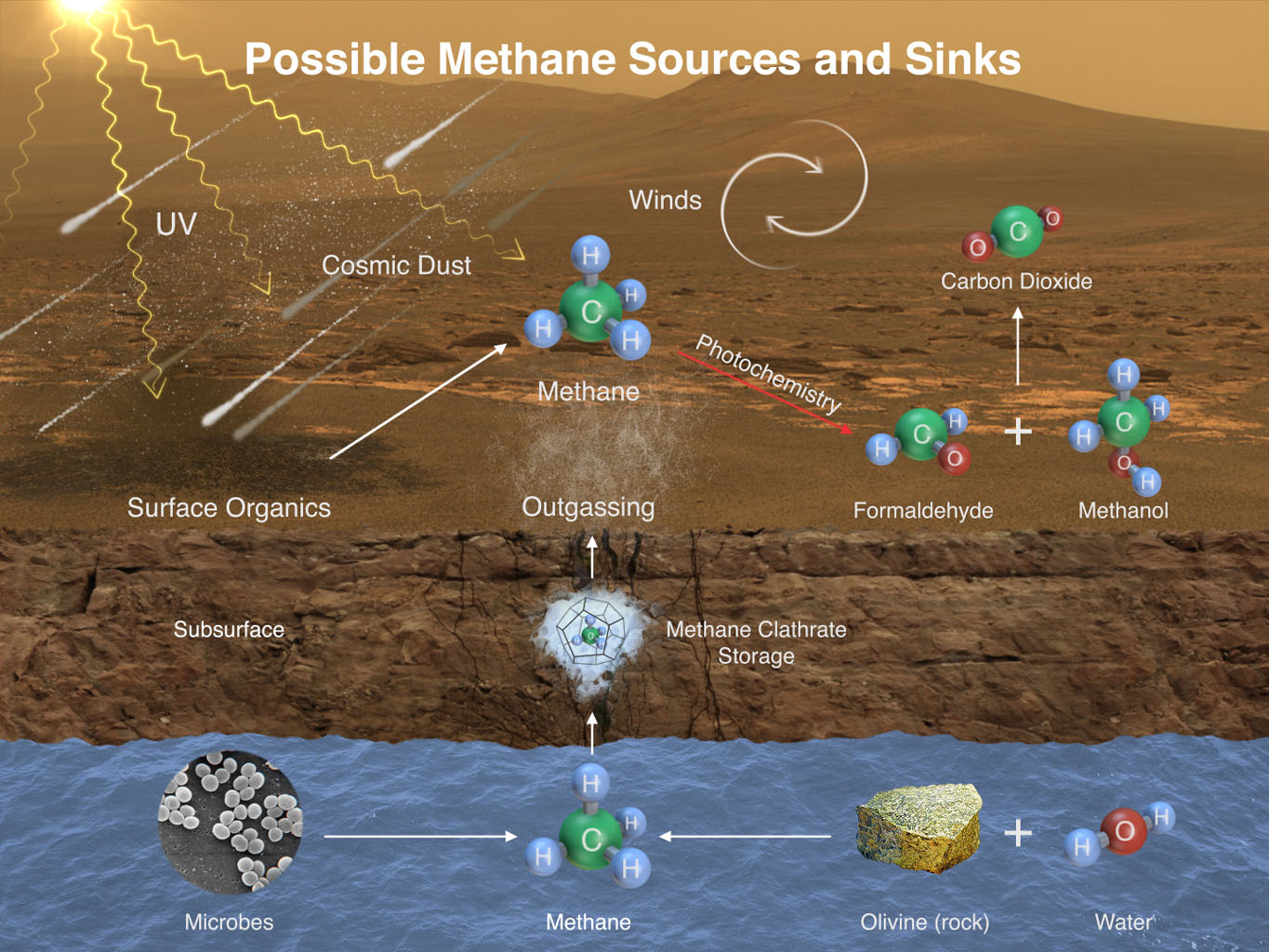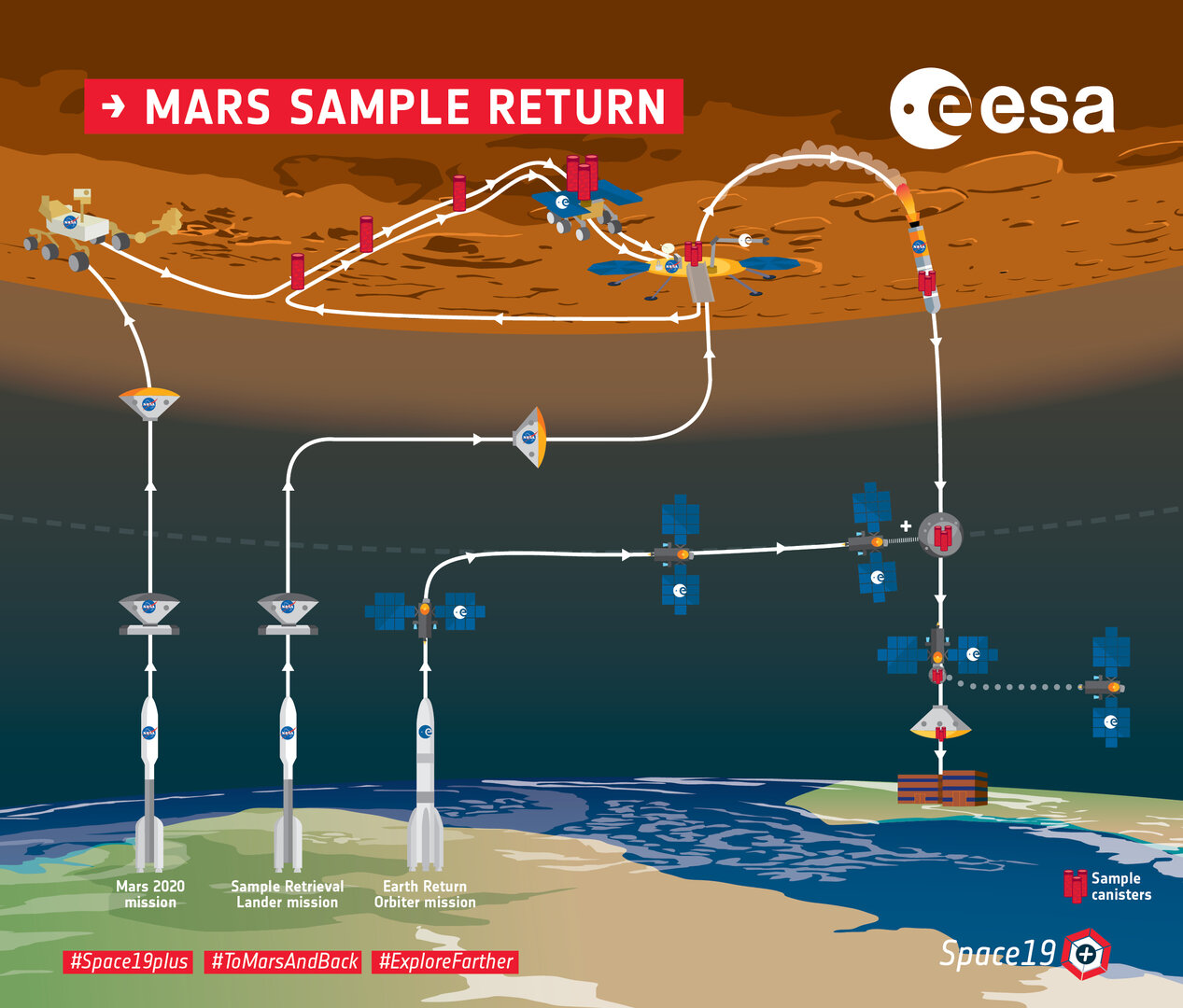

Space
NASA’s Curiosity rover discovers interesting Martian organics
NASA’s Curiosity rover touched down on the red planet, tasked with one major goal: to assess the habitability of Mars.
The rover landed in Gale Crater in 2012. The 96-mile-wide (154 km) crater was once the site of an ancient lake. Curiosity has returned evidence that not was this once a freshwater oasis, but it could have contained microbial life.
The roaming science lab has shown that dried up mud in the region contains organic molecules. Now this doesn’t mean that Curiosity found life. But it does mean that these molecules could have a biological origin. Or maybe not.
The mud samples were collected by the rover back in 2018 and scientists have been busy analyzing them. Scientists at Washington State University believe they have identified a group of interesting molecules, called thiophenes.

Thiophenes are particularly interesting because while they form through physical processes unrelated to living organisms, their ingredients could in fact have a biological origin. The molecules are composed of hydrocarbons and sulfur; when temperatures are greater than 248 °Fahrenheit (120 °C), they react through a process called thermochemical sulphate reduction (TSR).
On Earth thiopenes are found in incredibly interesting areas: crude oil deposits (which are made from dead organisms) and in coal (made from compressed, dead plants).
So how do they form on Mars? This is the question researchers have tried to answer.
“We identified several biological pathways for thiophenes that seem more likely than chemical ones, but we still need proof,” said astrobiologist Dirk Schulze-Makuch of Washington State University.

It’s entirely possible that sometime in Mars’ past, when the planet was warmer and wetter, that bacteria and other life forms could have thrived in its surface. They may have even left their mark in the mud. As such, it’s easy to assume these molecules are biological but we can’t just assume. We need hard evidence.
According to Schulze-Makuch, the presence of thiophenes has a number of explanations, not all of which are biological. For instance, the thiophenes could have been delivered by meteorites bombarding the planet, or they could form from geological processes like volcanism. Mars is seismically active and hosts a number of volcanoes, so this could be a likely explanation.

Here’s where the next-generation Mars rovers come into play. Both NASA and the European Space Agency are sending rovers to Mars this summer, in search of life. These two rovers are equipped with specialized instruments (that Curiosity lacks) that will be able to better analyze samples on the Martian surface.
But Schulze-Makuch thinks it will take sending people to Mars before we will find any definitive proof of life.
“I think the proof will really require that we actually send people there, and an astronaut looks through a microscope and sees a moving microbe,” he said.

News
Starlink gets its latest airline adoptee for stable and reliable internet access
The company said it plans to “rapidly integrate Starlink into its fleet,” and that the first Starlink-equipped aircraft will enter service this Summer.

SpaceX’s Starlink, the satellite internet program launched by Elon Musk’s company, has gotten its latest airline adoptee, offering stable and reliable internet to passengers.
Southwest Airlines announced on Wednesday that it would enable Starlink on its aircraft, a new strategy that will expand to more than 300 planes by the end of the year.
The company said it plans to “rapidly integrate Starlink into its fleet,” and that the first Starlink-equipped aircraft will enter service this Summer.
Tony Roach, Executive Vice President, Chief Customer and Brand Officer for the airline, said:
“Free WiFi has been a huge hit with our Rapid Rewards Members, and we know our Customers expect seamless connectivity across all their devices when they travel. Starlink delivers that at-home experience in the air, giving Customers the ability to stream their favorite shows from any platform, watch live sports, download music, play games, work, and connect with loved ones from takeoff to landing.”
Southwest also said that this is just one of the latest upgrades it is making to provide a more well-rounded experience to its aircraft. In addition to Starlink, it is updating cabin designs, offering more legroom, and installing in-seat power to all passengers.
Southwest became one of several airlines to cross over to Starlink, as reviews for the internet provider have raved about reliability and speed. Over the past year, Hawaiian Airlines, United Airlines, Alaska Airlines, airBaltic, Air France, JSX, Emirates, British Airways, and others have all decided to install Starlink on their planes.
This has been a major move away from unpredictable and commonly unreliable WiFi offerings on planes. Starlink has been more reliable and has provided more stable connections for those using their travel time for leisure or business.
Jason Fritch, VP of Starlink Enterprise Sales at SpaceX, said:
“We’re thrilled to deliver a connectivity experience to Southwest Airlines and its Customers that really is similar, if not better, than what you can experience in your own home. Starlink is the future of connected travel, making every journey faster, smoother, and infinitely more enjoyable.”
Starlink recently crossed a massive milestone of over 10 million subscribers.
Elon Musk
Elon Musk confirms SpaceX is not developing a phone

Despite many recent rumors and various reports, Elon Musk confirmed today that SpaceX is not developing a phone based on Starlink, not once, but twice.
Today’s report from Reuters cited people familiar with the matter and stated internal discussions have seen SpaceX executives mulling the idea of building a mobile device that would connect directly to the Starlink satellite constellation.
Musk did state in late January that SpaceX developing a phone was “not out of the question at some point.” However, He also said it would have to be a major difference from current phones, and would be optimized “purely for running max performance/watt neural nets.”
Not out of the question at some point. It would be a very different device than current phones. Optimized purely for running max performance/watt neural nets.
— Elon Musk (@elonmusk) January 30, 2026
While Musk said it was not out of the question “at some point,” that does not mean it is currently a project SpaceX is working on. The CEO reaffirmed this point twice on X this afternoon.
Musk said, “Reuters lies relentlessly,” in one post. In the next, he explicitly stated, “We are not developing a phone.”
Reuters lies relentlessly
— Elon Musk (@elonmusk) February 5, 2026
We are not developing a phone
— Elon Musk (@elonmusk) February 5, 2026
Musk has basically always maintained that SpaceX has too many things going on, denying that a phone would be in the realm of upcoming projects. There are too many things in the works for Musk’s space exploration company, most notably the recent merger with xAI.
SpaceX officially acquires xAI, merging rockets with AI expertise
A Starlink phone would be an excellent idea, especially considering that SpaceX operates 9,500 satellites, serving over 9 million users worldwide. 650 of those satellites are dedicated to the company’s direct-to-device initiative, which provides cellular coverage on a global scale.
Nevertheless, there is the potential that the Starlink phone eventually become a project SpaceX works on. However, it is not currently in the scope of what the company needs to develop, so things are more focused on that as of right now.
Elon Musk
Will Tesla join the fold? Predicting a triple merger with SpaceX and xAI

With the news of a merger between SpaceX and xAI being confirmed earlier this week by CEO Elon Musk directly, the first moves of an umbrella company that combines all of the serial tech entrepreneur’s companies have been established.
The move aims to combine SpaceX’s prowess in launches with xAI’s expanding vision in artificial intelligence, as Musk has detailed the need for space-based data centers that will require massive amounts of energy to operate.
It has always been in the plans to bring Musk’s companies together under one umbrella.
“My companies are, surprisingly in some ways, trending toward convergence,” Musk said in November. With SpaceX and xAI moving together, many are questioning when Tesla will be next. Analysts believe it is a no-brainer.
SpaceX officially acquires xAI, merging rockets with AI expertise
Dan Ives of Wedbush wrote in a note earlier this week that there is a “growing chance” Tesla could be merged in some form with the new conglomeration over the next 12 to 18 months.
“In our view, there is a growing chance that Tesla will eventually be merged in some form into SpaceX/xAI over time. The viewis this growing AI ecosystem will focus on Space and Earth together… and Musk will look to combine forces,” Ives said.
Let’s take a look at the potential.
The Case for Synergies – Building the Ultimate AI Ecosystem
A triple merger would create a unified “Musk Trinity,” blending Tesla’s physical AI with Robotaxi, Optimus, and Full Self-Driving, SpaceX’s orbital infrastructure through Starlink and potential space-based computer, and xAI’s advanced models, including Grok.
This could accelerate real-world AI applications, more specifically, ones like using satellite networks for global autonomy, or even powering massive training through solar-optimized orbital data centers.
The FCC welcomes and now seeks comment on the SpaceX application for Orbital Data Centers.
The proposed system would serve as a first step towards becoming a Kardashev II-level civilization and serve other purposes, according to the applicant. pic.twitter.com/TDnUPuz9w7
— Brendan Carr (@BrendanCarrFCC) February 4, 2026
This would position the entity, which could ultimately be labeled “X,” as a leader in multiplanetary AI-native tech.
It would impact every level of Musk’s AI-based vision for the future, from passenger use to complex AI training models.
Financial and Structural Incentives — and Risks
xAI’s high cash burn rate is now backed by SpaceX’s massive valuation boost, and Tesla joining the merger would help the company gain access to private funding channels, avoiding dilution in a public-heavy structure.
The deal makes sense from a capital standpoint, as it is an advantage for each company in its own specific way, addressing specific needs.
Because xAI is spending money at an accelerating rate due to its massive compute needs, SpaceX provides a bit of a “lifeline” by redirecting its growing cash flows toward AI ambitions without the need for constant external fundraising.
Additionally, Tesla’s recent $2 billion investment in xAI also ties in, as its own heavy CapEx for Dojo supercomputers, Robotaxis, and Optimus could potentially be streamlined.
Musk’s stake in Tesla and SpaceX, after the xAI merger, is also uneven. His ownership in Tesla equates to about 13 percent, only increasing as he achieves each tranche of his most recent compensation package. Meanwhile, he owns about 43 percent of the private SpaceX.
A triple merger between the three companies could boost his ownership in the combined entity to around 26 percent. This would give Musk what he wants: stronger voting power and alignment across his ventures.
It could also be a potential facilitator in private-to-public transitions, as a reverse merger structure to take SpaceX public indirectly via Tesla could be used. This avoids any IPO scrutiny while accessing the public markets’ liquidity.
Timeline and Triggers for a Public Announcement
As previously mentioned, Ives believes a 12-18 month timeline is realistic, fueled by Musk’s repeated hints at convergence between his three companies. Additionally, the recent xAI investment by Tesla only points toward the increased potential for a conglomeration.
Of course, there is speculation that the merger could happen in the shorter term, before June 30 of this year, which is a legitimate possibility. While this possibility exists but remains at low probability, especially when driven by rapid AI/space momentum, longer horizons, like 2027 or later, allow for key milestones like Tesla’s Robotaxi rollout and Cybercab ramp-up, Optimus scaling, or regulatory clarity under a favorable administration.

Credit: Grok Imagine
The sequencing matters: SpaceX-xAI merger as “step one” toward a unified stack, with a potential SpaceX IPO setting a valuation benchmark before any Tesla tie-up.
Full triple convergence could follow if synergies prove out.
Prediction markets are also a reasonable thing to look at, just to get an idea of where people are putting their money. Polymarket, for example, sits at between a 12 and 24 percent chance that a Tesla-SpaceX merger is officially announced before June 30, 2026.
Looking Ahead
The SpaceX-xAI merger is not your typical corporate shuffle. Instead, it’s the clearest signal yet that Musk is architecting a unified “Muskonomy” where AI, space infrastructure, and real-world robotics converge to solve humanity’s biggest challenges.
Yet the path is fraught with execution risks that could turn this visionary upside into a major value trap. Valuation mismatches remain at the forefront of this skepticism: Tesla’s public multiples are unlike any company ever, with many believing they are “stretched.” On the other hand, SpaceX-xAI’s private “marked-to-muth” pricing hinges on unproven synergies and lofty projects, especially orbital data centers and all of the things Musk and Co. will have to figure out along the way.
Ultimately, the entire thing relies on a high-conviction bet on Musk’s ability to execute at scale. The bullish case is transformative: a vertically integrated AI-space-robotics giant accelerates humanity toward abundance and multi-planetary civilization faster than any siloed company could.








